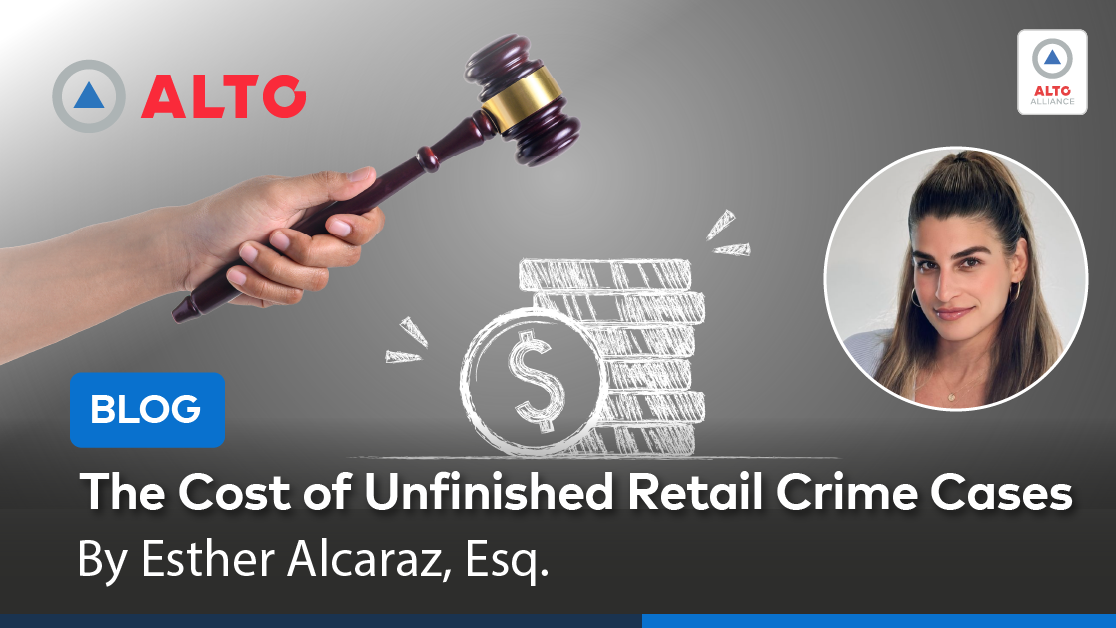By Esther Alcaraz, Esq.
Businesses know all too well that a shoplifter walking out the door isn’t the end of the story. What often goes unseen are the cases that never truly reach a conclusion in court. These are the “unfinished cases”, incidents where an arrest is made, but the follow-through falls short.
Listen to This Blog:
Why Cases Collapse
From my years as a prosecutor, I saw it happen repeatedly: incomplete evidence, missing witness statements, or inconsistent communication between store teams, law enforcement, and prosecutors. When that happens, cases stall. Charges get reduced or dismissed. Offenders are released, sometimes the very same day. And the cycle of crime continues, often escalating.
The collapse isn’t usually due to lack of effort, it’s due to a lack of complete, consistent, and usable information. Without it, even the strongest suspicions or clearest admissions may not hold up in court.
This problem is magnified by the scale of retail crime today. The National Retail Federation reports that retail losses reached $112.1 billion in 2022, up from $93.9 billion the year prior, shoplifting incidents have nearly doubled since 2019, and according to Pinkerton organized retail crime (ORC) now accounts for roughly 36% of those losses each year.
When cases collapse, the deterrent effect collapses with them. Offenders learn that the system is overloaded, evidence is incomplete, and consequences are unlikely.
The Hidden Costs
An unfinished case carries real consequences that ripple far beyond the courtroom:
- For businesses and retailers: Financial losses mount with each repeat incident. Losses aren’t just a line item; they threaten long-term viability and staff morale. Research shows that only 25% of stolen goods are ever recovered, leaving the vast majority unrecoverable.
- For prosecutors: Time and taxpayer resources are wasted on cases that ultimately go nowhere, reducing the system’s capacity to handle those that could make a difference.
- For law enforcement: Officers spend hours responding to calls, collecting statements, and filing reports. When cases don’t advance, that time is essentially wasted, pulling resources away from other community priorities. Repeat offenders also drain police bandwidth, since they are arrested multiple times for the same behaviors without lasting resolution.
- For communities: When offenders see weak follow-through, they are more likely to reoffend. The Manhattan Institute notes that under-reporting by retailers and inconsistencies across jurisdictions only compound the problem.
- For victims/employees: Store associates who experienced threats, intimidation, or even physical harm may feel their experience is invalidated if there is no true resolution.
Why Accountability Matters
Accountability isn’t about punishment for its own sake. It’s about ensuring that consequences are swift, certain, and meaningful — the three pillars of deterrence. When offenders know that a case will move forward, that restitution will be required, and that probation or incarceration may follow, the cycle begins to break.
And timing matters. The longer a case lingers in the system, the weaker it often becomes: evidence can be mishandled, and store personnel who served as witnesses may leave the company. By ensuring quick and efficient follow-up, we ring an alarm to the system that someone is paying attention and that makes better outcomes far more likely.
Independent research from the Loss Prevention Research Council (LPRC) shows that when ALTO supports cases, outcomes improve dramatically: 2.5× longer custody times, 7.4× higher restitution, and 40% fewer case dismissals. That’s the difference between unfinished business and real accountability.
Bridging the Gaps
At ALTO, we focus on closing these gaps. Our teams gather and organize documentation, connect directly with prosecutors, and ensure that cases don’t fall through the cracks. It’s not about replacing anyone’s role, it’s about reinforcing the system with the structure and persistence it needs.
Because unfinished cases don’t just disappear. They linger in the financial statements of businesses, in the workloads of prosecutors, in the fears of employees, and in the safety of communities.
The Verdict
True safety comes when justice is completed, not left unfinished. For retailers, police, prosecutors, and communities alike, the real cost of unfinished cases is too high to ignore.



